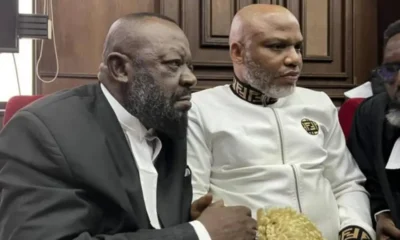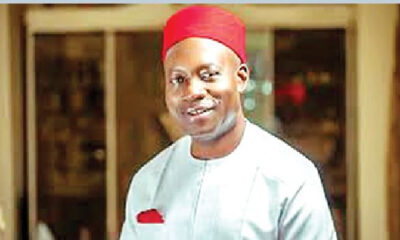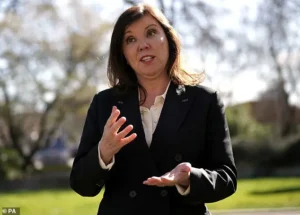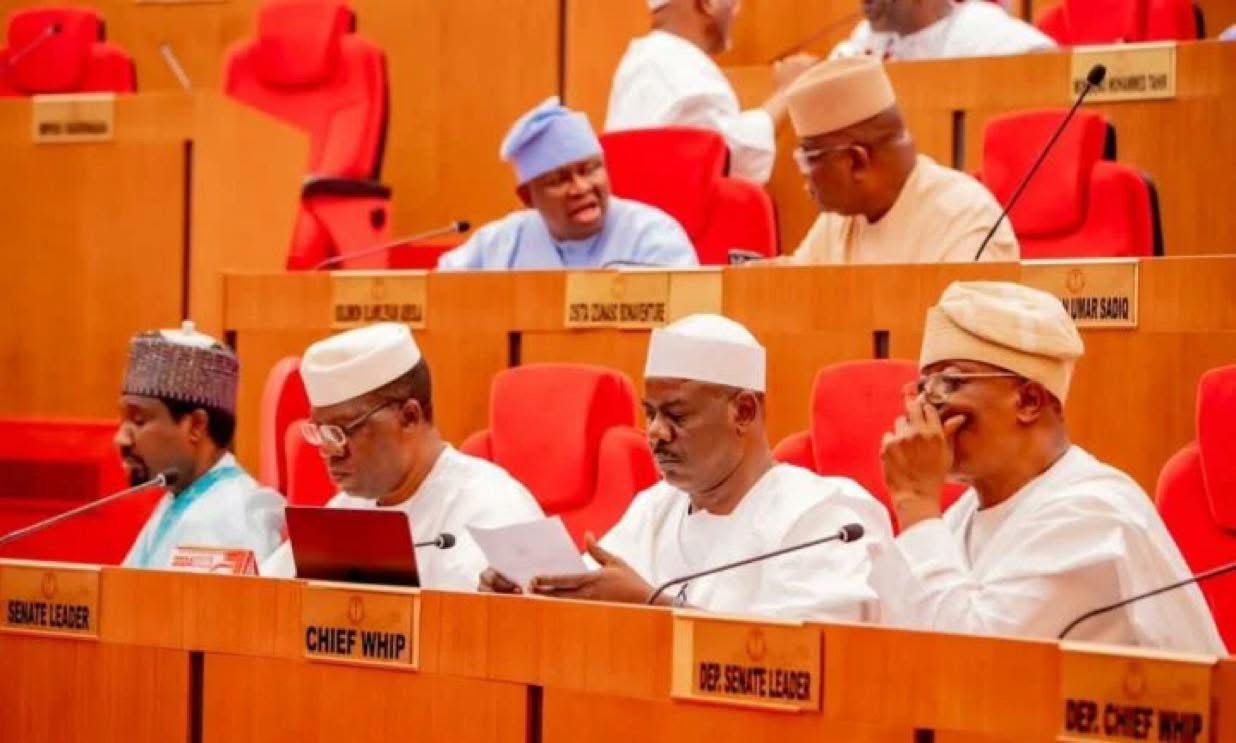Tech
Drilling borehole without regulation is bad practice – Kano Commissioner
Published
2 months agoon
By
Ekwutos Blog
The Kano State Government has vowed to regulate borehole drilling across the state, describing the indiscriminate practice as “absolute madness” that is depleting underground water reserves.
The State Commissioner for Water Resources, Alhaji Umar Haruna Doguwa, made this declaration while unveiling 10 new water pumps at the Tamburawa Water Treatment Plant on Saturday.
“You will notice in our towns now that open wells have dried up because the boreholes being drilled around have diverted the underground water. We will not allow this to continue,” Doguwa said.
He warned that the government would no longer tolerate the situation where individuals drill multiple boreholes in a single location without regulation.
“A situation where somebody will build many houses in one place and drill a borehole for each of the houses is madness, absolute madness, and we are not going to condone that,” he stated firmly.
Doguwa emphasized that underground water belongs to the state government, which has the legal mandate to regulate and monitor its use.
“It is our water. We have to know what you are using, you have to pay us, and we have to monitor it strictly,” he declared.
The commissioner also warned industries, commercial centers, and individuals against diverting treated water for farming.
He stressed that such activities deprive residents of access to drinking water.
“People are yearning for drinking water, yet some individuals illegally channel treated water to their farms. We are investigating those responsible, and if necessary, we will seize lands found engaging in such practices,” he warned.
He further explained that the 10 high-capacity water pumps unveiled at the event would be installed at the Tamburawa and Challawa Water Treatment Plants to boost water supply across the state.

You may like


Nnamdi Kanu detained, prosecuted for making same remark as DSS DG, Ajayi – Ejimakor


PDP chieftains in Katsina announce coalition to challenge APC in 2027


Former President Muhammadu Buhari sends his heartfelt condolences to the family of the of Alhaji Abbas Sunusi, Galadiman Kano, who passed away yesterday.


Anambra: Soludo unveils security supervisory committee


Algiers-Abuja direct flight service begins April 6 – Nigerian govt


NNPC: NAPE backs Tinubu on Kyari sack, Ojulari appointment
Tech
Children are turning to ChatGPT over their PARENTS for life advice
Published
6 minutes agoon
April 3, 2025By
Ekwutos Blog
Children are increasingly turning to online chatbots instead of their parents for answers to life’s biggest questions, the Children’s Commissioner has warned.
Dame Rachel de Souza will say in a speech today that the ‘apathy’ of many parents is causing a ‘crisis in childhood’ that is leading to many children feeling ‘disconnected’.
The Children’s Commissioner will say that artificial intelligence such as Chat GPT could end up filling knowledge gaps for children unless parents can show they will respond quicker than online chatbots.
Her comments come amid a national conversation about how the internet and social media are affecting children, which has been prompted by the hit Netflix drama Adolescence.
Today Dame Rachel will address the inaugural Festival Of Childhood alongside Education Secretary Bridget Phillipson, where she is expected to say that children just ‘want to be listened to’.

Dame Rachel de Souza, the Children’s Commissioner for England, has warned that the ‘apathy’ of many parents is causing a ‘crisis in childhood’ that is leading to many children feeling ‘disconnected’
She will warn that childhood must not be conflated with adulthood ‘because to do so abdicates us of our responsibility to making sure every child has all the things they should always have, and no child experiences the things they never should’.
Dame Rachel will say: ‘If we want children to experience the vivid technicolour of life, the joy of childhood, the innocence of youth, we have to prove that we will respond more quickly to them than Chat GPT.’
She will add: ‘Some of these foundations of childhood are cracking. A different version of childhood is playing out – one that we are struggling to be honest about. A crisis developing in childhood.
‘There is a risk of inaction, of apathy – and the antidote to this is listening. Connecting. That is why we must listen to children, to engage them on the decisions about their lives.’
The Children’s Commissioner has also carried out a new survey using her statutory powers to obtain responses from around 19,000 schools and colleges, representing almost 90 per cent of schools in England.

Dame Rachel de Souza has warned that children are increasingly turning to online chatbots instead of their parents for answers to life’s biggest questions (file photo)
The research has found that more than half – 55 per cent – of schools are worried about the online safety of their children.
The survey also found that 71 per cent of schools are concerned about children’s access to adolescent mental health services, while 46 per cent are worried about the impact of poverty on children.
Dame Rachel is also expected to set out her focus for the next 12 months, which will include looking at children’s trust in the police, harms cause by AI ‘deepfake’ technology, and the use of mobile phones in schools.
Education Secretary Bridget Phillipson said she pledged, upon entering office, that this would be a ‘child-centred government’.
She added: ‘This is exactly what we are delivering: better life chances for every child, wherever they live and whatever their background, putting their best interests at the heart of everything we do.’
Tech
Elon Musk has sold social media site X to his own AI company xAI for $33 billion
Published
4 days agoon
March 30, 2025By
Ekwutos Blog
Billionaire Elon Musk announced on Friday that he has sold social media site X, formerly known as Twitter when he bought it over two years ago, to his own artificial intelligence (AI) company xAI in a $33 billion (€30.5 billion) all-stock deal.
Both companies are privately held, which means they are not required to disclose their finances to the public.
Musk, who is also head of astronautical company SpaceX and carmaker Tesla, said in a post on X that the move will “unlock immense potential by blending xAI’s advanced AI capability and expertise with X’s massive reach”.
“xAI and X’s futures are intertwined. Today, we officially take the step to combine the data, models, compute, distribution, and talent,” Musk posted.
“The combined company will deliver smarter, more meaningful experiences to billions of people while staying true to our core mission of seeking truth and advancing knowledge,” he added.
Musk said the deal values xAI at $80 billion (€74 billion) and X at $33 billion (€30.5 billion).
Ambitions for xAI
The South African-born tech mogul, who also serves as an advisor to President Donald Trump heading the unofficial DOGE department, bought the site then called Twitter for $44 billion (€40 billion) in 2022, gutted its staff, and changed its policies on hate speech, misinformation, and user verification and renamed it X.
He launched xAI a year later.
“Since its founding two years ago, xAI has rapidly become one of the leading AI labs in the world, building models and data centres at unprecedented speed and scale,” Musk wrote on X.
Musk announced in December that the AI start-up would be expanding its supercomputer ‘Colossus’ in a bid to take on rivals like OpenAI, increasing the number of graphics processing units (GPUs) in order to develop new AI models at faster rates.
It’s not clear if the move will change anything for X users – xAI already uses data from X user posts to train its AI models and paying X users have access to its AI chatbot, Grok.
Tech
The senate has called on the federal government to take urgent action to address the rising cost of data services in the country.
Published
5 days agoon
March 29, 2025By
Ekwutos Blog
During Wednesday’s plenary, lawmakers debated a motion sponsored by Asuquo Ekpeyong, senator representing Cross River south, highlighting the financial strain caused by recent hike in data tariffs.
Ekpeyong warned that the surge in data costs was a major setback for young Nigerians who depend on the internet for their livelihoods.
He argued that many young people use digital platforms for freelancing, e-commerce, content creation, and software development, making affordable internet access crucial to their economic survival.
“Telecommunication providers in Nigeria have recently increased the cost of data services by as much as 200%. A move that has placed significant financial strain on millions of Nigerians, especially young people who rely on the internet for their livelihood,” he said.
“Young Nigerians have embraced the digital economy, leveraging the internet for various income-generating activities including freelancing and remote work, direct marketing and social media management, e-commerce, content creation on various platforms, online training, software development, web design, mobile app creation, content creation of various platforms, online education, etc.
“The senate notes that young Nigerians have embraced the digital economy, leveraging the internet for their livelihood, leaving them heavily dependent on mobile telecommunications companies for internet access, and that the sudden and substantial increase in data cost threatens their economic survival and limits access to critical digital services.
“The senate is further concerned that the reasons provided by telecom providers for the data price hike, including high operational costs of favourable exchanges, are untenable, and appears that instead of addressing the root causes of the high cost of doing business in Nigeria, the burden is being unfairly transferred to end-users.
“Senate is aware that the high cost of doing business in Nigeria is driven by multiple challenges, such as increased operational risk and insurance costs.
“The senate believes that urgent government intervention is required to ensure that affordable internet access remains available to all Nigerians, particularly to the young Nigerians who are at the backbone of Nigeria’s digital economy.
“The senate accordingly resolves to urge the federal government to engage with telecommunication providers to review the recent increase in data costs and ensure the pricing remains fair and affordable for all Nigerians.”
The motion was seconded by Titus Zam, senator representing Benue north-west, and received the support of other lawmakers.
Victor Umeh, senator representing Anambra central, criticised not just the rising cost of data but also increases in telecom charges and Pay TV tariffs, accusing regulatory bodies of failing to protect Nigerians.
“If you buy airtime or data, within minutes, you are out of it. Nigerians are suffering so much, and we cannot turn a blind eye,” he said.
Sadiq Umar, senator representing Kwara North, warned that the price hike disproportionately affects young people, who form a significant part of Nigeria’s workforce.
“These service providers must make life easier for young Nigerians, not harder. The government needs to step in before this situation worsens,” he said.
Following the debate, Senate President Godswill Akpabio put the motion to a vote, and it was unanimously adopted.
Lawmakers urged the federal government to engage telecom providers to review and reduce the recent increase in data costs.
They also called on the ministry of communications, innovation, and digital economy to develop a policy framework for affordable internet access.
Lawmakers further recommended the creation of tech hubs across the country to provide free or subsidised internet for entrepreneurs, students, and innovators.
They also directed the senate committee on communications to investigate the factors driving high data costs and propose solutions to make the telecom sector more business-friendly.
Speaking after the motion was adopted, Akpabio praised Ekpeyong for raising the issue, saying the intervention would support young entrepreneurs and ensure fair pricing in the digital economy.
“This motion, when implemented, will assist our young entrepreneurs, not only to remain in business but also to ensure that they have affordable pricing that allows them to generate profits,” he said.

Plea bargain unfair in criminal justice system – Group

Children are turning to ChatGPT over their PARENTS for life advice

EU mulls countermeasures to new US tariffs
Trending

 Trending5 months ago
Trending5 months agoNYA demands release of ‘abducted’ Imo chairman, preaches good governance
- Business5 months ago
US court acquits Air Peace boss, slams Mayfield $4000 fine

 Politics5 months ago
Politics5 months agoMexico’s new president causes concern just weeks before the US elections
- Entertainment5 months ago
Bobrisky transferred from Immigration to FCID, spends night behind bars
- Entertainment5 months ago
Bobrisky falls ill in police custody, rushed to hospital

 Politics5 months ago
Politics5 months agoRussia bans imports of agro-products from Kazakhstan after refusal to join BRICS

 Politics5 months ago
Politics5 months agoPutin invites 20 world leaders
- Politics1 year ago
Nigerian Senate passes Bill seeking the establishment of the South East Development Commission.
